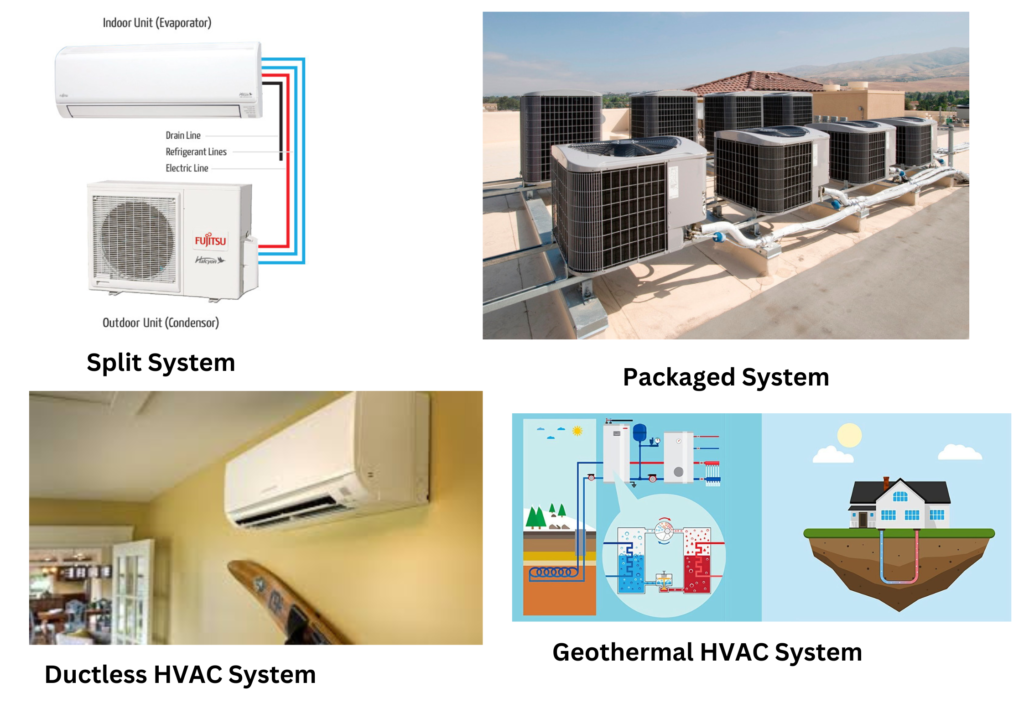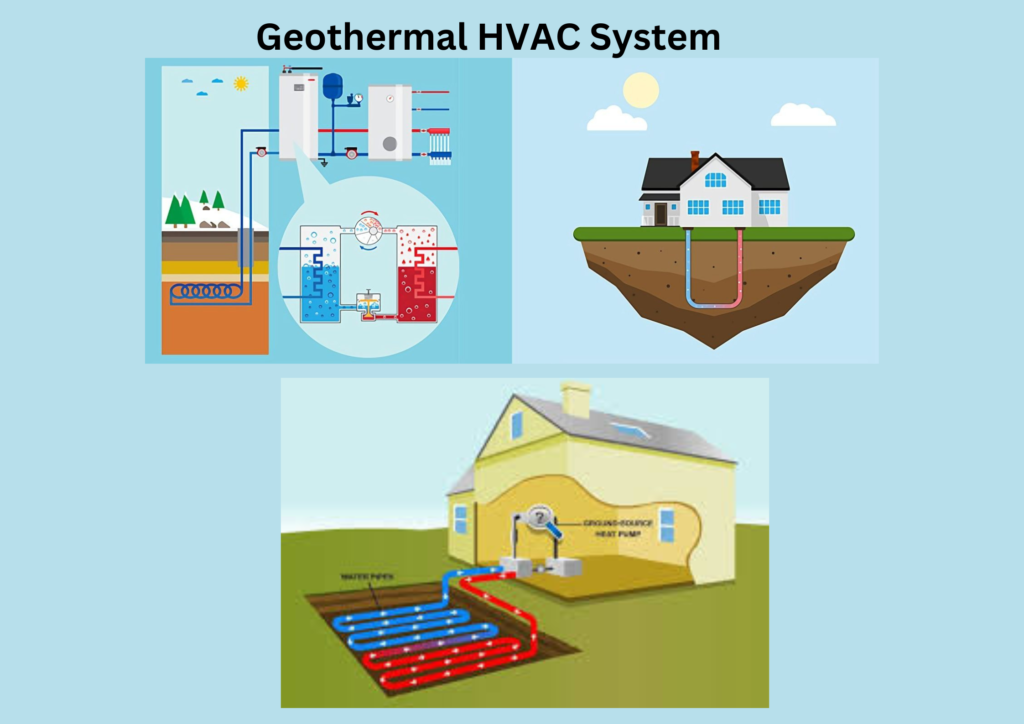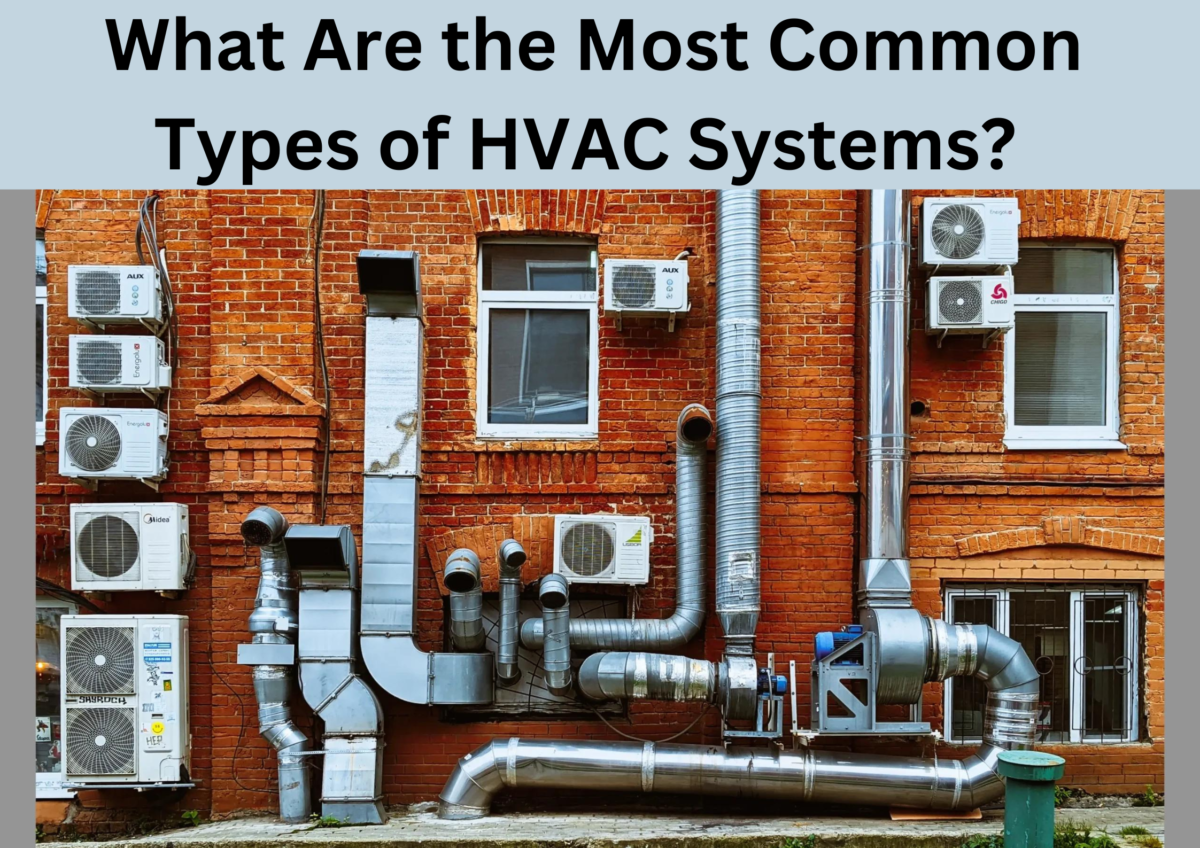There are a lot of options available if you are selecting a new HVAC system for your home. There are many types, sizes, brands are available in the market. So, it must be very confusing to select the right one for your home.
This article explains in detail the most commonly asked question about the HVAC system “What Are the Most Common Types of HVAC Systems?”. Read the full article, get a clear idea, and select the best HVAC system for your home.
What Is an HVAC System?
HVAC refers to heating, ventilation, and air conditioning. An HVAC system is a complete home comfort system. Its basic working principle is based on thermodynamics, heat transfer, and fluid mechanics. It offers the desired temperature, ideal humidity level, and optimal air quality inside a home, or, a large building.
The basic components of an HVAC system include a thermostat, air conditioner, heat pump, furnace, air handler, and ductwork. It converts the outdoor air conditions
HVAC systems are used in various types of buildings such as residential, industrial, commercial, and institutional buildings. The main goal of an HVAC system is to provide thermal comfort to users and maintain good indoor air quality through proper ventilation with filtration.
What Are the Most Common Types of HVAC Systems
Ducted HVAC System
Ducts in HVAC systems are the passages or pathways that are used to deliver or remove air. The air vents are the visible openings that control the airflow and through which air is supplied inside the room.
So, the ducted HVAC systems contain a series of air ducts that distribute the hot and cool air throughout the residential or commercial buildings. The standard split HVAC system and the packaged HVAC system belong to this category.
Standard Split System
Definition: A standard split system contains a heating unit installed inside and a cooling unit that is installed outside. These are the most commonly used HVAC systems.
Working Principle:
The heating unit usually contains a heater that is located in the basement or any other indoor area and an evaporator or fan that distributes heat through the building’s ductwork.
The cooling unit contains compressors, refrigerants, coils, etc. which are connected via a series of tubing. This unit generates and circulates cool air throughout the building and extracts the hot air from it.
Pros:
- Customizable: The placement of these separate units is more flexible.
- Energy efficient: A standard split system is highly energy efficient. The SEER rating of this system is 25 or above.
Cons:
- As split systems contain more moving parts there are high chances of cracks, crevices, etc. present in the system.
- The installation cost of split systems is more expensive.
- If the system is not installed properly it reduces the efficiency.

Furnace and Air Conditioner
This type of HVAC system is an integrated system that contains a furnace for heating purposes and an air conditioner to generate cool air. The demand for this type of HVAC system is higher in locations where warm weather prevails like Texas, or, Florida.
Working Principle:
This HVAC system uses a gas, oil, or, electricity furnace for heating which is usually located inside the home. The condensing unit of the air conditioner is placed outside of the home. Another important part of the system is the evaporator coils which are usually placed inside the furnace cabinet.
The evaporator coils capture the heat from the indoor air and push it outside through refrigerants flowing in tubes. The refrigerant is a heat transfer medium that converts the low-pressure gas to a high-pressure liquid. It absorbs the heat and supplies the cool air inside the room. This HVAC system draws indoor air and circulates the conditioned air throughout the home.
Pros of Furnace and Air Conditioner:
- Maintains constant temperature: This type of HVAC system provides consistent heating and cooling throughout the home.
- Energy Efficiency: This type of system with advanced features is highly energy efficient.
Cons of Furnace and Air Conditioner:
- The installation cost of this HVAC system is higher.
- It requires regular maintenance to offer the best performance. As the installation process is highly complex, you need professionals to install this type of HVAC system.
Furnace and Heat Pump
This is an integrated HVAC system that combines a furnace and a heat pump. These systems are suitable for places with extremely cold climates.
Working Principle:
This is a hybrid or dual-fuel heating system. During mild cold conditions, the heat pump activates to generate heat and makes the place warm and comfortable.
In freezing temperatures when the heat pumps become insufficient to generate heat, the gas-fired furnace takes over and offers additional heat to keep the place warm.
Pros of Furnace and Heat Pump:
- These types of HVAC systems are best suited for places with cold and freezing climates.
- These systems are energy efficient.
Cons of Furnace and Heat Pump:
- In freezing temperatures, the power consumption becomes double and this increases the energy bills.
- At temperatures below 20 degrees Celsius the heat pumps are unable to operate.
Air Handler and Heat Pump
This type of HVAC system contains a heat pump that is placed outside the home and an air handler that is located inside the home. These systems are used in places where the freezing temperature is rare.
Working Principle:
The objective of a heat pump is to heat or cool the air through the refrigerant. It functions both ways and provides both heat and cool air. Thus, this type of system eliminates the requirements of a distinct air conditioner and furnace.
Instead of the furnace, there is an air handler which is placed inside the home. The hair handler contains a blower motor to circulate hot and cool air throughout the home.
Pros of Air Handler and Heat Pump:
- Simple operating process: It simplifies the operating process because of the dual operating capability of a heat pump. Thus, it offers constant comfort throughout the year.
- Low Operating cost: This type of HVAC system does not use any fuel source to generate heat and thus they are highly energy efficient and save a lot of money.
- Safety: As these systems do not use any fuel source, it eliminates the chances of natural gas leaks or, carbon monoxide poisoning. Thus, they are very safe to operate.
Cons of Air Handler and Heat Pump:
- Expensive: These types of HVAC systems are complex to install and costly to purchase.
Packaged System
In a packaged HVAC system, all the heating and cooling components are accommodated in a single large cabinet. These packaged systems are placed outside the house such as on the roof or, near the building foundation. These systems are suitable for homes without basements.
Working principle:
These HVAC systems are connected to the building’s supply or return ducts. This system is also furnished with a blower that extracts the air inside the room for processing and circulates the conditioned air throughout the home.
These systems are used for both cooling and heating purposes. So, they are available in different types such as gas/electric, heat pumps, and hybrid systems.
Pros of Packaged Systems:
- Packaged systems are placed outside the home so, the operating process is very quiet. It does not produce any type of noise inside the home.
Cons of Packaged Systems:
- This system is less efficient than split systems and offers fewer customization options.
- As it is placed outdoors, it is not very durable and has a shorter life span.
Ductless Split System
This type of HVAC system does not contain any air ducts. These HVAC systems are suitable for small buildings or, temporary work sites.
Woking Principle:
These systems either consist of an air conditioner which is placed outside the room to provide cool air or, they contain heat pumps for both cooling and heating purposes. The fan is installed inside the room to circulate the conditioned air throughout the room.
Pros of the Ductless Split System:
- Adjustable: These ductless split systems consist of separate thermostats to maintain the desired temperature of individual rooms. You can adjust the temperature according to the requirements.
- Low energy consumption: The individual units consume energy as per requirements. It reduces the wastage of energy.
Cons of the Ductless Split System:
- These systems are not effective for extremely cold environments.
Duct-free Mini-Split
These HVAC systems are installed in separate rooms. For each individual room it has a separate compressor, condenser, heat pump, thermostat, power cable, etc.
By installing a duct-free mini-split system you can regulate the temperature of individual rooms or only occupied rooms. This reduces power consumption and saves more energy.
Hydronic Heating
The hydronic heating system uses liquid instead of air to radiate heat. This system can be implemented in a radiant flooring system which consists of a series of pipes under the floors.
The water is boiled inside a boiler and the hot water is distributed through the pipes. When the liquid reaches the radiator it circulates the heat inside the room.
Portable Spot Cooler
These are the portable AC units. It extracts the indoor air inside it passes it over the coils containing refrigerant. The refrigerant extracts the heat and supplies the cool air inside the room. These systems are used to cool large rooms, manufacturing facilities, or other outdoor spaces.
Portable Heat Pump
These portable HVAC systems are used for both cooling and heating purposes. A user can switch between cooling and heating options through a reversing valve inside the unit.
In heating mode, the system extracts the indoor air inside it, passes it over a condenser coil, and circulates warm air throughout the room.
Geothermal HVAC System

The basic principle of a geothermal HVAC system is to generate heat by utilizing underground sources like heat and soil. These systems are highly energy efficient and environmentally friendly.
Working Principle:
This type of HVAC system transfers heat back and forth from the ground. It has an underground piping system installed inside the water or ground to circulate water inside it. This system does not require external power sources to generate heat. Rather it uses the water inside the piping system to maintain the desired temperature inside the home.
The heat from the ambient air inside the home is transferred to the ground and also heat from the ground is transferred inside the building to make it warm. Thus, in this process, the moderate temperature inside the ground helps to maintain the desired temperature inside the building.
Pros of Geothermal system:
- Geothermal HVAC systems are highly energy efficient and help in reducing the electricity bill.
Cons of Geothermal system:
- Geothermal HVAC systems are very expensive usually 2 to 5 times more than other HVAC systems.
- Installation of these systems is very complex and the installation costs are very high.
- The maintenance is difficult and the maintenance costs of these systems are also high.
What Are the Factors to Consider While Purchasing an HVAC System?
Capacity:
While purchasing an HVAC system you must first consider the capacity of this system. This is measured in BTUs (British Thermal Units) which explains the amount of heat required to raise the temperature of 1 pound of water by 1 degree Fahrenheit. The higher the BTU value the greater the capacity of an HVAC system.
Efficiency:
The efficiency of an HVAC system can be denoted as the ratio between the capacity of the system to the amount of power required to operate the system. The efficiency varies based on the type of heating or cooling equipment. While buying an HVAC system, the SEER (seasonal Energy Efficiency Ratio), HSPF, AFUE, and EER ratings should be taken into consideration.
Noise Level:
Noise levels are expressed in decibels (dB). While buying you should check the noise level written on the package by the manufacturer. The ideal noise level should be below 60 dB.
Maintenance:
An HVAC system with low maintenance is preferable. You should also consider a service plan that combines a warranty card, and regular servicing with discounts on repairs into the overall price.
Temperature and Air Quality:
The best HVAC system can help maintain the ideal humidity level and improve indoor air quality. So while purchasing an HVAC system you must consider how the system will affect the indoor temperature level, air quality, and operational cost.
Brand Model:
To get the best value of your money you must buy a good brand HVAC system. It increases efficiency, improves performance, and also saves a lot of energy.
Features:
An HVAC system with advanced features like renewable sources integration, smart features, sound rating, blower speed, two-stage heating and cooling, etc. are recommended to buy.
Conclusion
An HVAC system includes an air conditioning unit, heat pump, furnace, blower, air ducts, etc. However, the main two categories of an HVAC system are ducted HVAC systems and ductless HVAC systems. Again, the ducted HVAC systems are of two types standard split system and packaged system. Geothermal HVAC systems are the most environmentally friendly systems. This type of HVAC system transfers heat back and forth from the ground. However, these systems are very expensive to install and maintain.
FAQS
- What is the most common type of HVAC system?
The standard split system is considered the most common type of HVAC system. This type of HVAC system contains a heating unit installed inside and a cooling unit that is installed outside.
2. What is the load in HVAC systems?
The amount of electrical power consumed by the HVAC system to maintain the desired indoor temperature is known as the load in the HVAC systems.
Also Read
- 6 Types of HVAC Systems for Homes 2024
- How Does a Refrigerator Work? A Step-by-Step Guide 2024
- 8 Reasons Why Refrigerator Not Cooling and Solutions
- Side By Side Vs French Door Refrigerator 2024
- Counter Depth Refrigerator vs. Standard Refrigerator: Which One Is Better?
- Where Should I Place My Air Purifier? 2024
- How Do You Know If You Need an Air Purifier? 2024
- HEPA Air Purifier: Definition, Types, Uses, Efficiency, Working Principle
- Whole House Air Purifier: Types, Pros, Cons, Working Principle 2024
- Air Purifier Advantages and Disadvantages
- How Do Air Purifiers Help? 6 Benefits
- Whole House Dehumidifier: Types, Working Principle, Pros, Cons 2024
- How Does a Commercial Dehumidifier Work? 2024
- How Does a Dehumidifier Work? Types, Uses, Benefits 2024
- 10 Tips for Buying a Dehumidifier
- Dehumidifier Vs Air Purifier 2024
- Dehumidifier vs. Air Conditioner 2024
- Cool Mist Humidifier: Types, Uses, Benefits, Working Principle 2024
- Do Humidifiers Help with Air Quality? 2024
- When Do You Need a Humidifier? 8 Common Signs
- How Do Humidifiers Work? A Complete Guide 2024
- How Humidifier Helps Breathing? 2024
- Humidifier Vs Dehumidifier Vs Air Purifier: Which One Should You Buy? 2024


6 thoughts on “What Are the Most Common Types of HVAC Systems? 2025”